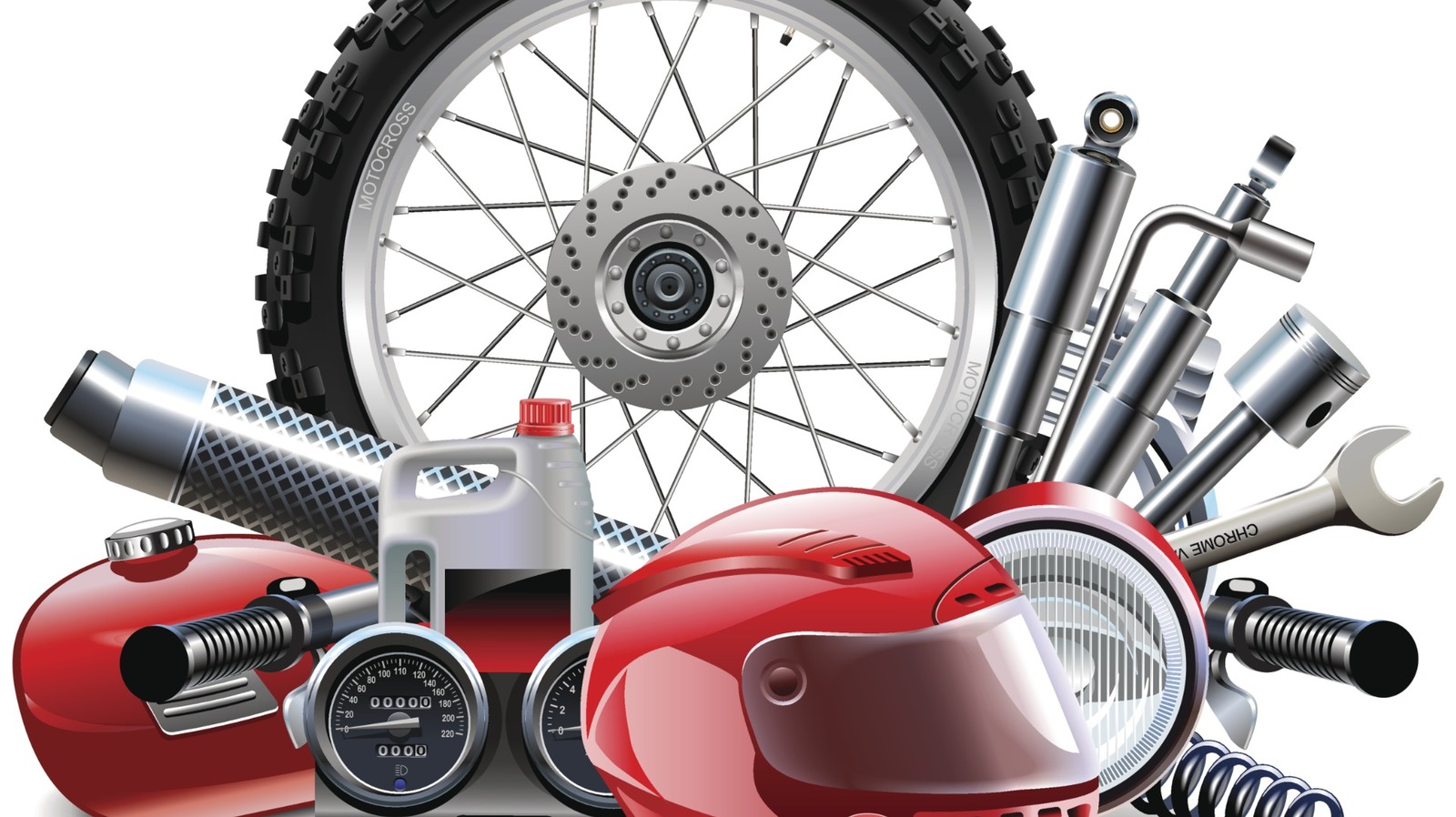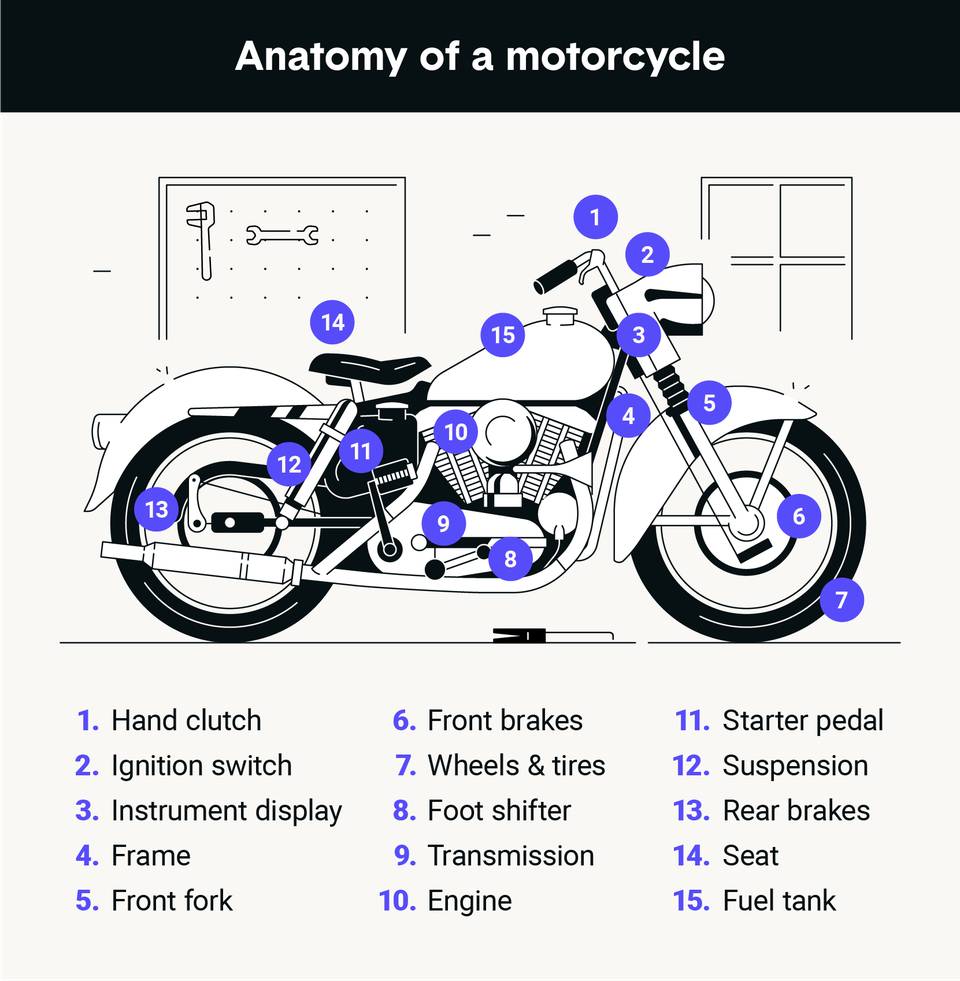Learn How to Match Your Bike’s Needs with the Right Motorbike Components NZ
Learn How to Match Your Bike’s Needs with the Right Motorbike Components NZ
Blog Article
Discover the Essential MotorBike Components You Required for Optimal Efficiency
Recognizing the vital components of a motorcycle is essential for achieving peak performance. Each element, from the engine to the stopping system, plays a crucial role in overall performance and safety. Normal upkeep can stop unexpected failures and boost the riding experience. Lots of cyclists ignore the ins and outs of these systems. Uncovering just how they interact can lead to an extra reliable experience. What essential components should every biker prioritize?
The Engine: The Heart of Your Motorcycle
The engine works as the core component of a motorbike, driving its efficiency and specifying its capabilities. It is in charge of converting fuel into power, which powers the bike forward. Different sorts of engines are employed, including single-cylinder, V-twin, and inline setups, each offering distinctive features matched for various riding styles and purposes. The engine size, commonly measured in cubic centimeters (cc), substantially influences performance, with bigger engines generally supplying even more power and torque.Furthermore, the engine's design and innovation, such as fuel injection systems or air-cooling versus liquid-cooling, impact efficiency and reliability. Maintenance is essential for peak operation; factors like regular oil modifications and checking ignition system guarantee long life. Bikers commonly consider an engine's responsiveness and level of smoothness, as these qualities boost the general riding experience. Eventually, the engine continues to be a critical element that defines not only the motorbike's efficiency but also the rider's link to the maker.
The Transmission: Moving Gears Efficiently
The transmission plays an essential duty in a motorbike's performance, especially in the technicians of equipment changing. Understanding exactly how to change gears smoothly can improve the general riding experience, while routine upkeep guarantees peak performance. Correct focus to these elements can substantially influence the durability and efficiency of the bike.

Gear Shifting Mechanics
Smooth gear moving is essential for optimal motorbike performance, substantially influencing both acceleration and control. The technicians of equipment moving involve the communication between the clutch, gear bar, and transmission system. When a motorcyclist involves the clutch, it disengages the engine from the transmission, enabling a gear adjustment without harming the parts. A well-timed launch of the clutch, combined with specific activity of the equipment bar, helps with a smooth adjustment between equipments. This process assures that the engine runs within its finest power band, enhancing performance. Motorbike Components NZ. Furthermore, recognizing the gear ratios and their result on rate and torque can help motorcyclists make informed choices throughout changes, inevitably adding to an extra receptive and delightful riding experience
Maintenance Tips Importance
Regular maintenance plays an essential function in guaranteeing that the transmission system runs effectively, enabling smooth equipment shifts. On a regular basis examining and altering the transmission fluid is essential, as old liquid can result in raised friction and wear. Additionally, examining the clutch for wear warranties peak engagement and disengagement, preventing slippage throughout gear adjustments. Lubrication of relocating components is similarly vital to decrease friction and enhance performance. Bike owners ought to additionally keep an eye on for leakages and unusual noises, as these can indicate underlying concerns. By sticking to these maintenance pointers, cyclists can lengthen the lifespan of their transmission system, ensuring that gear shifts stay smooth and adding to the overall performance of their motorcycle.
The Braking System: Ensuring Safety on Every Ride
Braking systems are fundamental components that straight affect a motorcycle's safety and performance. They include different components, consisting of brake pads, blades, calipers, and hydraulic lines, all interacting to assure efficient deceleration. The sort of braking system-- typically either disc or drum-- affects responsiveness and stopping power.Regular upkeep is vital to maintain peak efficiency; worn brake pads can result in reduced effectiveness and enhanced stopping ranges. In addition, the quality of brake fluid must be checked, as it can absorb wetness with time, compromising stopping efficiency.Riders ought to additionally think about the value of anti-lock braking systems (ABDOMINAL), which avoid wheel lockup throughout sudden stops, enhancing overall security. Correctly working brakes are not practically quiting; they impart self-confidence in the motorcyclist, enabling safer navigating through different terrains. Inevitably, a reliable braking system is essential for enjoying every adventure with satisfaction.
The Suspension: Enhancing Convenience and Control
A well-functioning shock absorber substantially adds to a motorbike's overall performance, complementing the performance of the braking system. The suspension plays a considerable duty in taking in shocks from unequal surface areas, assuring a smoother trip while keeping tire call with the roadway. This get in touch with is vital for both security and control, allowing cyclists to browse edges with confidence and precision.Different sorts of suspension systems, such as telescopic forks or mono-shocks, provide varying degrees of comfort and handling. Effectively tuned suspension enhances responsiveness, offering the cyclist with a much more connected feeling to the motorbike. Routine upkeep checks are necessary to ascertain the suspension components, including springtimes and dampers, are functioning at their finest. An effective shock absorber not only boosts the riding experience however also adds to the long life of various other motorcycle components by decreasing damage. Because of this, spending in top quality suspension is crucial for any severe motorbike lover.
The Tires: Attaching You to the Roadway
Tires play an important role in a motorbike's performance, functioning as the primary link between the road and the rider. Understanding the various types of tires available can substantially affect handling and security. Furthermore, regular upkeep is crucial to guarantee peak tire performance and durability.
Tire Types Explained
Exactly how do different tire types influence a motorbike's efficiency? Tire types play an essential duty in establishing a motorbike's hold, stability, and handling. Sporting activity tires, made for high efficiency, deal improved traction and responsiveness on paved roads, making them excellent for competing and hostile riding. Alternatively, visiting tires focus on durability and comfort, supplying a smoother adventure for here long-distance traveling. Off-road tires, identified by their tough step patterns, stand out in grip on unpaved surfaces, ideal for experience lovers. Furthermore, dual-sport tires blend characteristics from both on-road and off-road groups, satisfying functional riding needs. Ultimately, picking the appropriate tire type is crucial for optimizing performance, ensuring safety, and enhancing the total riding experience.
Maintenance Tips Offered
While riding when traveling, preserving ideal tire problem is important for safety and efficiency. Regularly examining tire pressure is vital, as under-inflated tires can cause inadequate handling and boosted wear. It is a good idea to evaluate walk deepness regularly; used tires compromise grip and security. Additionally, riders need to try to find signs of damage, such as cracks or bulges, which can indicate the demand for substitute. Rotating tires periodically ensures even put on, enhancing long life. Moreover, maintaining tires clean from particles and avoiding extreme aesthetics can extend their life-span. Lastly, keeping correct alignment and balance contributes to come to a head performance, reducing stress on various other bike elements. Sticking to these maintenance pointers will greatly boost the overall riding experience.
The Gas System: Fueling Performance and Efficiency
The fuel system plays an essential role in making best use of a motorcycle's performance and effectiveness, as it guarantees the optimum distribution of fuel to the engine. It comprises a number of crucial elements, consisting of the fuel tank, fuel pump, fuel filter, and fuel injectors or carburetor. Each component has to work effectively to guarantee a smooth and powerful ride.The gas container stores gas and provides it to the engine using the gas pump, which produces the essential stress. A fuel filter prevents impurities from going into the engine, while the injectors or carburetor mix gas with air for combustion.Proper maintenance of the gas system is critical; a clogged filter or malfunctioning injector can result in reduced efficiency and increased fuel consumption. By verifying that the fuel system runs effectively, bikers can appreciate enhanced throttle reaction, better gas economy, and in general boosted riding experience.
The Electric System: Powering Your Adventure
An effective electric system is crucial for the overall functionality and safety of a motorcycle, as it powers crucial parts such as the ignition, lights, and various electronic systems. This system consists of the battery, which stores power, and the generator, liable for producing power while the engine runs. The circuitry harness links these elements, guaranteeing trustworthy power distribution.Additionally, fuses safeguard the system from overloads, while relays help regulate high-current tools with low-power signals. A well-maintained electric system enhances efficiency by making sure smooth starts and consistent procedure of signals and lights, crucial for biker presence and safety.Regular checks of the battery's fee and links are very important for protecting against electric failures. Riders should likewise check circuitry for deterioration, ensuring all elements work ideally. Ultimately, a robust electric system contributes considerably to the total performance and dependability of the motorcycle.
Often Asked Inquiries
Just how Often Should I Replace My Bike's Battery?
The regularity of bike battery replacement relies on use and maintenance (Bike Parts Wellington). Typically, batteries need to be replaced every three to 5 years. Normal checks can aid recognize when a substitute is needed for peak performance
What Tools Do I Need for Standard Motorcycle Upkeep?
For standard motorcycle upkeep, one requires vital tools such as an outlet set, wrenches, screwdrivers, pliers, tire stress scale, and a torque wrench. These devices help with efficient maintenance and assure the motorbike runs effectively and safely.
How Can I Improve My Motorbike's The rules of aerodynamics?
To enhance motorcycle aerodynamics, one ought more to take into consideration readjusting fairings, making use of windshield extensions, optimizing body placement, and reducing overall weight. These alterations help lessen drag, enhancing stability and fuel effectiveness during rides.
What Are the Signs of a Failing Electrical System?
Indicators of a stopping working electrical system include published here dimming lights, problem starting, uneven instrument analyses, and blown fuses. Motorcycle Spares Christchurch. Uncommon scents or corrosion around battery terminals might likewise suggest underlying problems needing prompt attention for security and performance

Just how Do I Choose the Right Oil for My Bike?
When picking oil for a bike, one must take into consideration the supplier's requirements, viscosity scores, and the sort of riding. Additionally, traditional versus artificial oil can impact efficiency and engine defense, influencing the choice greatly. The engine dimension, generally measured in cubic centimeters (cc), substantially influences efficiency, with bigger engines normally providing even more power and torque.Furthermore, the engine's layout and technology, such as gas injection systems or air-cooling versus liquid-cooling, influence efficiency and integrity. A well-functioning suspension system substantially adds to a motorcycle's overall efficiency, enhancing the performance of the stopping system. The fuel system plays a crucial duty in maximizing a motorbike's efficiency and effectiveness, as it guarantees the optimal delivery of fuel to the engine. A gas filter protects against impurities from going into the engine, while the injectors or carburetor mix gas with air for combustion.Proper maintenance of the gas system is critical; a clogged filter or malfunctioning injector can lead to decreased performance and enhanced fuel consumption. A well-kept electrical system enhances performance by guaranteeing smooth begins and constant operation of lights and signals, vital for biker presence and safety.Regular checks of the battery's cost and connections are essential for protecting against electrical failures.
Report this page